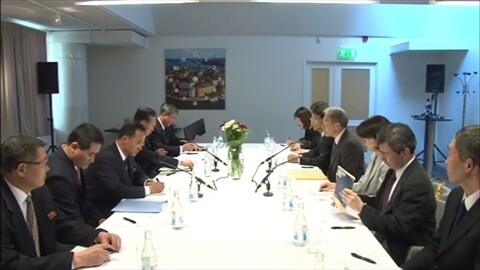hankyoreh
Links to other country sites 다른 나라 사이트 링크
What is N. Korea offering Japan on the abductee issue?

By Gil Yun-hyung, Tokyo correspondent
Does North Korea have something to offer Japan on the abductee issue?
On May 31, Japan’s Nikkei newspaper reported that North Korea had made statements at government talks with Japan late last month suggesting that it was acquiring information on surviving Japanese abductees.
According to Nikkei, North Korean representatives ensured their Japanese counterparts that a reinvestigation “would produce results” at the meeting in Stockholm on May 26-28.
According to some Japanese government officials, Japanese representatives were taking the remarks as a signal of information about the surviving abductees, and demanding that Pyongyang produce a list of survivors to back it up. Rather than answering, North Korea’s response has been to hint at the presence of Japanese residents and refer to “specific locations in North Korea,” the sources said.
The situation suggests that Pyongyang went into the talks with Japan having already taken steps to produce something to satisfy the public on the abductee issue. One potential “card” could be a dramatic event like the “return of any survivors discovered,” as mentioned in the May 29 agreement.
Intelligence suggesting the main North Korean official behind the agreement is also a key associate who has the ear of leader Kim Jong-un has given more credibility to the speculation.
“The North Korean figure behind the agreement approached the Japanese Foreign Ministry in 2011 identifying himself as the successor to former State Security Department director Ryu Kyong,” the Asahi Shimbun newspaper reported on May 31. Ryu, who played a leading role in the Pyongyang Statement of Sept. 2002, was one of former leader Kim Jong-il’s closest associates who helped arrange for a Pyongyang visit by then Japanese Prime Minister Junichiro Koizumi. He also appeared as “Mr. X” in “The Peninsula Question” a book on the North Korean nuclear issue by former Asahi Shimbun editor-in-chief Yoichi Funabashi, before he was executed in 2011.
Based on this analysis, Japan is interpreting that the “special authority” of the special investigation committee mentioned by Pyongyang in the agreement could be the authority to investigate any and all organizations in North Korea on orders from Kim Jong-un.
Japanese Chief Cabinet Secretary Suga Yoshihide, hinted in an interview with broadcaster NHK at the possibility of sending an investigative team composed of officials from the foreign ministry and police agency, if needed.
As the North Korean committee is launched, Japan is planning to lift some of its own sanctions on personnel exchanges, wire transfers, and cash limits. Trade between North Korea and Japan was as high as 46 billion yen (US$452 million) in 2002 before plummeting to 14.1 billion yen (US$138.7 million) in 2006, then drying up more or less completely.
While observers are divided on whether the first lifting of sanctions will have much of an effect, they see some possibility for life in the isolated North Korean economy if the negotiations conclude with the resumption of Mangyongbong-92 passenger ferry service.
Please direct questions or comments to [english@hani.co.kr]

Editorial・opinion
![[Editorial] Does Yoon think the Korean public is wrong? [Editorial] Does Yoon think the Korean public is wrong?](https://flexible.img.hani.co.kr/flexible/normal/500/300/imgdb/original/2024/0417/8517133419684774.jpg) [Editorial] Does Yoon think the Korean public is wrong?
[Editorial] Does Yoon think the Korean public is wrong?![[Editorial] As it bolsters its alliance with US, Japan must be accountable for past [Editorial] As it bolsters its alliance with US, Japan must be accountable for past](https://flexible.img.hani.co.kr/flexible/normal/500/300/imgdb/original/2024/0417/6817133413968321.jpg) [Editorial] As it bolsters its alliance with US, Japan must be accountable for past
[Editorial] As it bolsters its alliance with US, Japan must be accountable for past- [Guest essay] Amending the Constitution is Yoon’s key to leaving office in public’s good graces
- [Editorial] 10 years on, lessons of Sewol tragedy must never be forgotten
- [Column] A death blow to Korea’s prosecutor politics
- [Correspondent’s column] The US and the end of Japanese pacifism
- [Guest essay] How Korea turned its trainee doctors into monsters
- [Guest essay] As someone who helped forge Seoul-Moscow ties, their status today troubles me
- [Editorial] Koreans sent a loud and clear message to Yoon
- [Column] In Korea’s midterm elections, it’s time for accountability
Most viewed articles
- 1[Column] The clock is ticking for Korea’s first lady
- 2Samsung barricades office as unionized workers strike for better conditions
- 3[Editorial] When the choice is kids or career, Korea will never overcome birth rate woes
- 4[Guest essay] How Korea turned its trainee doctors into monsters
- 5Why Israel isn’t hitting Iran with immediate retaliation
- 6S. Korea, Japan reaffirm commitment to strengthening trilateral ties with US
- 7Japan officially says compensation of Korean forced laborers isn’t its responsibility
- 8[Editorial] As it bolsters its alliance with US, Japan must be accountable for past
- 9Korea, Japan jointly vow response to FX volatility as currencies tumble
- 10‘Right direction’: After judgment day from voters, Yoon shrugs off calls for change